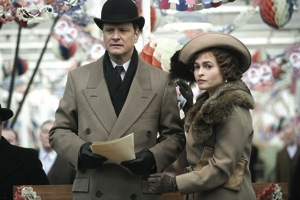
Last week, the Oscar nominations were announced, and The King’s Speech led the pack with a whopping 12, including Best Picture. If you’re like me, and you follow awards season with the sort of obsessiveness that, say, a Packers fan is following the playoffs this year, this was slightly eyebrow-raising. If you’re more of a casual movie-goer and notice movies based on tons of advertising and whether people are arguing about them on Facebook, you might have said, “Wait … what?”
In fact, if you go to Google Trends and enter The King’s Speech along with The Social Network, True Grit,Incep-tion, and Black Swan (movies you’d have to live in a cave not to know about), you’ll discover that compared to these other Best Picture nominees, the movie about stuttering and King George VI barely even registers as a search topic in the last 12 months. Not even in England.
But the Oscars are the gay Super Bowl. Just as you have to have an opinion about Ben Roethlisberger’s alleged sexual assaults and how adorable Aaron Rodgers is before the Steelers and Packers go at it on Sunday, you should have some sort of opinion about The King’s Speech before the awards are handed out three weeks later. In case you’re too busy watching the other nine nominees for Best Picture, seven or eight of which I think are better, here’s a cheat sheet answering frequently asked questions.
What’s it about? It is the 1930s, Prince Albert (Colin Firth), the second son of King George V (Michael Gambon), has a terrible stutter, and for someone who must represent the royal family by, among other things, giving speeches, this brings Albert, or Bertie, deep shame and a lot of anger.
He’s met with numerous speech therapists, all of whom have failed to help him. Bertie’s concerned and arch wife, Elizabeth (Helena Bonham Carter), finds another therapist, Lionel Logue (Geoffrey Rush), a sarcastic and informal Australian living in London.
After George V dies, Bertie’s brother (Guy Pearce) takes the throne, but he soon abdicates because of his desire to marry a divorced woman, which isn’t allowed in the Church of England. Suddenly, Bertie becomes King George VI and Lionel is needed to help the new king speak to his people.
Within 15 minutes, it becomes clear that the film is going to be a bromantic version of My Fair Lady; it has scenes centered on silly tongue twisters and comedy and conflict based on class divisions. If you know just a little bit of history of the United Kingdom in the 1930s, then you know how the movie ends.
Who’s in it? While there are a number of well-known actors throughout the film (and Helena Bonham Carter was nominated for an Oscar for playing the future Queen Mother of Elizabeth II), the movie is mostly about the teacher-student, doctor-patient friendship between Firth’s Bertie and Rush’s Lionel. It’s a classic dramatic relationship, and the chemistry between the two actors makes their scenes crackle with humor, angst, fear and a certain kind of love.
Firth is expert at playing the proper Brit, and Bertie is the most extreme of this type. He gets to be nervously and sardonically funny, but he also communicates subtly and beautifully Bertie’s pathos, the result of being raised and damaged by abusive nannies and the weirdest possible of parents, a king and queen of England.
Rush is just as perfectly cast; few actors can do such a symphony of wit, compassion and toughness.
Is it any good? It’s impossible to deny how skillfully, even perfectly, made the movie is. Every key performance is, yes, Oscar worthy, and the direction, costumes, sets and music is impeccable.
The cinematography is surprisingly artful for what is mostly a movie about conversations in sitting rooms. But the script, like the plot and acting choices, is obvious. I’m never thrilled when I know exactly what is going to happen in a movie before the end of the first act and it’s not just because I remember my high school European History class.
The King’s Speech is formulaic and about as risky as a long episode of Masterpiece Theater.
Anything gay about it? Some might argue that English accents are inherently gay, but other than that, no. But as the wife of first a prince and then a king, Helena Bonham Carter is pretty queeny.
Anyone hot in it? Colin Firth is rather handsome, and Guy Pearce is, too, but they’ve both been a lot more attractive in other movies, especially when they were younger. In The Single Man last year, for instance, Firth was strikingly sexy as a sad gay English professor. Helena Bonham Carter has been sexy in the past, but not here.
So, no. Unless you have a fetish for well-cut English suits and/or royal uniforms, this movie will not leave you hot under the collar.
So, wait, how did it get all of these Oscar nominations? Oscar voters like movies about rich, damaged, funny, now dead British people, especially when those people are played by great actors.
What will it win? There will be snow fights in Hell if Colin Firth doesn’t win an Oscar for Best Actor. Everything else is somewhat up for grabs, but never underestimate Hollywood’s celebration of the inoffensive and easily digestible. It could win everything.












Colin’s was absolutely outstanding in the King’s Speech!